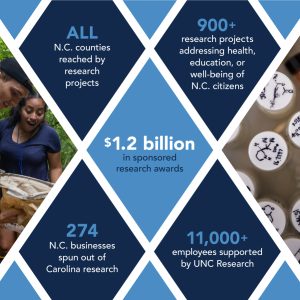 As we wrap up the semester and the calendar year, I am reflecting on the momentous accomplishments that our researchers and research administrators have made. There is so much to be proud of. In 2022, it was a great year to be a Tar Heel.
As we wrap up the semester and the calendar year, I am reflecting on the momentous accomplishments that our researchers and research administrators have made. There is so much to be proud of. In 2022, it was a great year to be a Tar Heel.
This year, we topped $1.2B in research awards, continuing our year-to-year growth in sponsored research activity and showing gains across most disciplines. Additionally, more than 30 researchers from Carolina made Clarivate’s Highly Cited Researchers list as trailblazers among their peers. Those recognized had papers that ranked in the top 1% of citations for field and publication year.
With support from the state legislature and the N.C. Collaboratory, the VISION study was launched this fall which will assess the effects of long COVID, as well as factors associated with reinfections. With 7,500 participants, this is the largest study of its kind in North Carolina. And this is in addition to the $65 million awarded to the Gillings School of Global Public Health by the NIH’s National Institute of Allergy and Infectious Diseases to establish an Antiviral Drug Discovery Center to develop oral antivirals that can combat pandemic-level viruses like COVID-19.
 Just this past October, the Carolina Population Center opened a branch of the Triangle Federal Statistical Research Data Center (Triangle RDC) which is part of the Federal Statistical Research Data Center (FSRDC) program. Under this program, researchers with approved proposals can perform statistical analysis on non-public microdata from the Census Bureau’s economic, health, and demographic censuses and surveys. These datasets are among the largest and most important sources of statistical information in the nation and many of them can only be accessed through a FSRDC.
Just this past October, the Carolina Population Center opened a branch of the Triangle Federal Statistical Research Data Center (Triangle RDC) which is part of the Federal Statistical Research Data Center (FSRDC) program. Under this program, researchers with approved proposals can perform statistical analysis on non-public microdata from the Census Bureau’s economic, health, and demographic censuses and surveys. These datasets are among the largest and most important sources of statistical information in the nation and many of them can only be accessed through a FSRDC.
Earlier in the year, a $10 million gift from the Winston Family Foundation established the Winston National Center on Technology Use, Brain and Psychological Development, a research center that will create more tools for parents, caregivers, and teens to make better informed choices about how they interact with technology and social media.
Wei You, chair of the department of chemistry in UNC’s College of Arts & Sciences, was awarded $7.5 million from the U.S. Department of Defense in the spring to develop organic semiconductors for the next generation of electronics. This work has the potential to improve the portability, energy efficiency, and durability of screens and information display devices used in the cockpit and the field.
Our faculty researchers also showed tremendous innovation in approaches that impact the health and well-being of North Carolinians all across the state. The Southern Futures initiative continued to reimagine the stories we tell about our region through the lens of art and healing. With funding from the NIH, Rachel Good in the School of Social Work is designing a culturally relevant digital technology resource to treat binge eating and obesity in Black women. The North Carolina Area Health Education Centers (NC AHEC) program also celebrated its 50th anniversary this year. NC AHEC’s mission is to provide educational activities and services in areas with less access to resources to recruit, train, and retain the workforce needed to create a healthy state.
Additionally, researchers in the School of Education and the College received $2 million in funding from the National Science Foundation to pioneer methods to help university students struggling in mathematics and science courses, a wonderful opportunity for our own students.
The Innovation District in downtown Chapel Hill gained momentum this spring when construction of the 20,000 square foot UNC-Chapel Hill Innovation Hub began. Once complete, the Hub will house Innovate Carolina and feature much needed co-working space for UNC life sciences startup ventures. This year, the Board of Trustees approved the Institute for Convergent Science as a campus-wide center, which is currently hard at work on several exciting projects, including PFAS-contamination mitigation and a gene therapy biomanufacturing foundry.
Within the Office of the Vice Chancellor for Research, we made impressive headway on many of our internally led initiatives and partnerships. We hosted the largest University Research Week to date, welcomed North Carolina State into our International Galapagos Science Consortium, launched the Looking Forward Program with our partners at North Carolina A&T, and made steady progress on aligning clinical research resources across the university, UNC Health, and the School of Medicine with the UNC ONE Clinical Research Initiative. We also welcomed new leaders into our organization who will help us strengthen the research enterprise by making advancements in translational research, convergent science, clinical trials, compliance, and more.
I have captured only a few of the many accomplishments made across the research enterprise in 2022, and I am so eager and excited to see what 2023 will bring.
